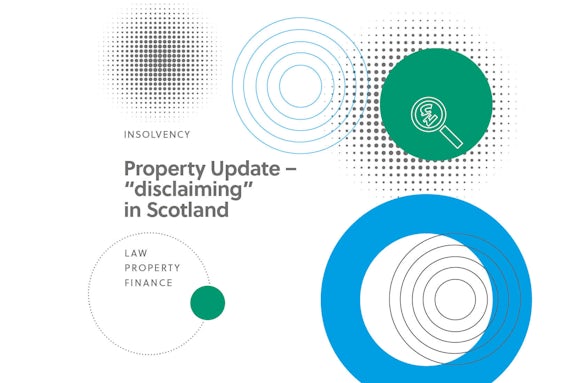Property Update
Sections 178-180 of the Insolvency Act 1986 enables liquidators of companies in England and Wales to disclaim onerous property and leases. Onerous property is broadly defined and includes unprofitable contracts and any other property that is unsaleable or may give rise to a liability to pay money or perform onerous obligations. Disclaiming terminates the onerous obligation. Any person who suffers loss or damage as a result of the disclaimer is treated as a creditor of the company and can make a claim in the liquidation.
However, there is no equivalent provisions in the legislation for liquidators of Scottish companies. Are Scottish liquidators stuck with onerous property and leases? The answers depends on what the onerous obligation is.
Contracts and leases
Liquidators of Scottish companies can refuse to perform obligations under a contract to which the company in liquidation was a party. The refusal to perform does not terminate the contract. The other party to the contract is unable to force the liquidator to perform the contractual obligations and instead is able to make a claim in the liquidation for any losses resulting from the refusal to comply with the contract.
When it comes to leases, liquidators have to make a choice about either adopting the lease or abandoning it. Where the liquidator chooses to abandon the lease, the lease does not terminate but the landlord is able to make a claim in the liquidation for losses incurred. This is not ideal from either a landlord’s or a tenant’s perspective. Landlords have to be very careful to ensure that they properly manage their unit if a liquidator tells them that they have “abandoned” the lease, which includes securing and insuring it. A landlord will often want a lease to remain in place to ensure that they do not inadvertently take on liabilities for occupancy, local authority rates for example. An abandonment can also have significant consequences with regards supplies to the unit, both at the time and for any future incoming tenants. A liquidator will also most likely be faced with a landlord asserting that the lease continues so the liability for the landlord’s losses will be ongoing.
Land
The Scottish Coal Company decision in 2013 made it clear that liquidators of Scottish companies could not abandon land owned by the company. A real right in land can only be transferred to another person. While a liquidator cannot abandon ownership of the land, they can stop the company’s possession and occupancy of it. The liquidator can also stop complying with most other obligations of a land owner in the same way that they can refuse to perform other contractual obligations. Not all obligations of a land owner can be escaped – the Scottish Coal Company decision took the view that certain statutory environmental licences could not be abandoned by the liquidators as the statutory regime intended the licences to transfer to liquidators who would need to surrender them in accordance with the statutory provisions.
Conclusion
Disclaiming does not apply to liquidations of Scottish companies. However, liquidators are not stuck with all onerous property – they can abandon leases and refuse to comply with contractual obligations. The Landlord of a Scottish unit with an English company tenant that enters into liquidation could find their lease being disclaimed, but the same landlord with a Scottish company tenant would not be met with the same situation, even if the Scottish company is tenant in a unit in England or Wales. Quite why there is this significant difference between the law in Scotland and that in England and Wales is entirely unclear. We would welcome the Government taking steps to afford Scottish liquidators the same powers as those of their English and Welsh counterparts and hope that this will happen in 2022.
Eilidh MacEwan by email: emacewan@gilsongray.co.uk or by phone: 0131 285 1809 / 07376 192 463.
Steven Jansch by email: sjansch@gilsongray.co.uk or by phone: 0131 516 5361 / 07841 920 100.
Craig Darling by email: cdarling@gilsongray.co.uk or by phone: 0141 530 2044/07841 920 467
The information and opinions contained in this blog are for information only. They are not intended to constitute advice and should not be relied upon or considered as a replacement for advice. Before acting on any of the information contained in this blog, please seek specific advice from Gilson Gray







